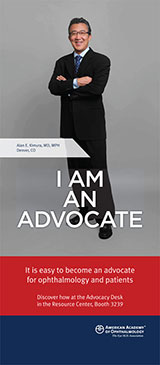 All of us invested greatly in ourselves to earn the right to join the profession of ophthalmology. Today, we are part of the $2,700,000,000,000 medical-industrial complex — a maddeningly complex and highly regulated system.
All of us invested greatly in ourselves to earn the right to join the profession of ophthalmology. Today, we are part of the $2,700,000,000,000 medical-industrial complex — a maddeningly complex and highly regulated system.
There is no aspect of our practice that is unaffected by legislation and regulation. This includes medical licensure, specialty board certification, graduate medical education, electronic health records, quality reporting and reimbursement policies/the sustainable growth rate, to name just a few. Yet physicians remain largely disengaged from the legislative process. Physicians in the 21st century must now be competent in the political process that produces the legislation that impacts us so greatly.
For me, advocacy is the confluence of curiosity and conscience. Curiosity drove me to try to understand the “rules of the game” of politics. Laws do not simply drop from the sky. They are created within the political system with input from the best-organized stakeholders. If you have not exposed yourself to the basic rules of the game, you are likely to become a cynic, or feel like a victim. Rules will appear to be arbitrary, and you feel powerless to control events. In the 21st century, it takes money and time to build personal relationships with legislators to advance your agenda. Otherwise your silence leaves other stakeholders to achieve their goals, not yours.
Conscience drove me to shoulder my responsibility to be a good steward of the profession, and to fulfill our social contract with society, speaking on behalf of our patients. These interests require an ongoing investment of time and money to defend.
Like my fellow advocates, I consciously choose to get involved, rejecting the role of cynic, victim, or worse, the bystander. Earning the right to become an ophthalmologist required an investment of time and money. So, too, does defending the profession from blunt legislative acts or regulations with unintended consequences require a modest annual investment of every member’s time and money.
I choose advocacy rather than self-censorship. The silence of self-censorship signals indifference to the political system. The political system responds to organization and strength.
A few advocates cannot carry the load for the entire profession. When each of us individually chooses to advocate in some form, then collectively that mass response has political power to influence legislation and regulation. Choose strength, and advocate!
Alan E. Kimura, MD, MPH, is a retina specialist in Denver.